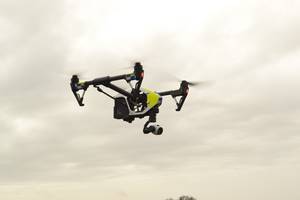South West forces begin drones trial
Police in Devon, Cornwall and Dorset have embarked on a six-month trial of unmanned aerial vehicles (UAVs), more commonly known as drones, to enhance their approach to operations such as missing persons searches and crime scene photography.
Police in Devon, Cornwall and Dorset have embarked on a six-month trial of unmanned aerial vehicles (UAVs), more commonly known as drones, to enhance their approach to operations such as missing persons searches and crime scene photography.
Devon and Cornwall Police began trialling two DJI Inspire 1 drones at the beginning of November and last week Thursday (November 26) Dorset Police began its trial of two drones a Phantom 2 plus and a DJI Inspire.
The UAVs are equipped with high-definition (HD) cameras, which can capture both video and still images.
Devon and Cornwall Police Inspector Andy Hamilton, who is leading the trials as part of the Alliance Operations department, said: Drones offer many benefits that complement the National Police Air Service (NPAS) helicopter and is by no means a replacement for this service.
This technology offers a potentially highly cost-effective approach to missing person searches, crime scene photography and responding to major road traffic collisions.
Using a drone to capture footage on difficult terrain and hard-to-reach areas, such as cliffs or woodland, to find a missing person, combat wildlife crime or even a firearm incident, will allow officers to gain vital information quickly and safely and allow us to respond effectively at the scene.
Civil Aviation Authority (CAA) regulations state that drone operators must pass a national CAA accredited qualification.
Devon and Cornwall Police currently has three trained operators in place for the trial, including Insp Hamilton, and there are plans to train further officers should the trial prove to be a success. Dorset also currently has three trained pilots.
Insp Hamilton added: This technology still has its limitations; the models we are trialling are currently unable to fly at night or in adverse weather, but having the option to put a drone in the air in a few minutes notice could help save lives.
The drones have a HD downlink, which means officers on the ground can see live footage captured by the drone in the air. It can stay in the air for up to 18 minutes at a time before returning to the operator to change batteries. Each drone has several batteries and therefore can be kept operational for a prolonged period of time if required.
A new twitter account has been created, @DC_PoliceDrones, which will keep the public informed about where and when a drone is in operational use within Devon and Cornwall. The account will also share operational footage and images of a drone in action.




